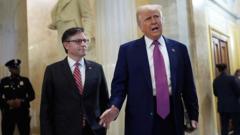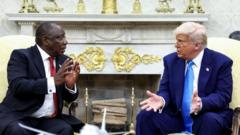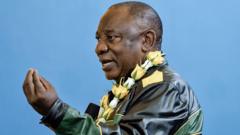Despite a false social media statement by President-elect Trump regarding Chinese soldiers at the Panama Canal, U.S. officials are increasingly alarmed by China's extensive investments and strategic influence in global shipping and port operations.
Misconceptions Amidst Genuine Concerns: China's Growing Influence in Global Shipping

Misconceptions Amidst Genuine Concerns: China's Growing Influence in Global Shipping
President-elect's claims about Chinese soldiers operating the Panama Canal are debunked, yet concerns over Chinese control of global ports persist among U.S. officials.
In a shocking holiday message on December 25, President-elect Donald J. Trump took to his social media platform, Truth Social, where he claimed that “wonderful soldiers of China” were “lovingly, but illegally,” operating the Panama Canal. However, this statement has been swiftly discredited. The Panama Canal is managed by the Panama Canal Authority, an agency of the Panamanian government. President José Raúl Mulino of Panama clarified that there are no Chinese personnel involved in the canal's operations, except for those on vessels or visiting as tourists.
While Trump's assertion may be incorrect, the increasing dominance of Chinese companies and governmental influences in global port operations has raised substantive concerns for U.S. national security. Chinese investments in ports around the world have skyrocketed, providing them significant control over international shipping routes. With China being the largest exporter globally, their private enterprises have gained notable authority in shipping logistics and operations, which could potentially allow for surveillance and a strategic edge over competing nations.
A spokesperson from the Trump-Vance transition team articulated that the potential for Chinese control over major infrastructures, such as the Panama Canal, is perceived as a national security risk by U.S. officials. The emphasis on the pressing implications of China's port influence underlines a broader debate about international trade dynamics and the impact of foreign investments on domestic security interests. As global supply chains grow more interconnected, such concerns about the authority and reach of Chinese interests are likely to remain in the national discourse.






















